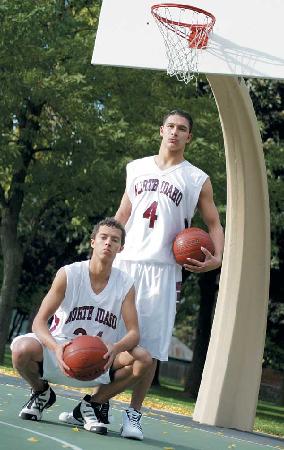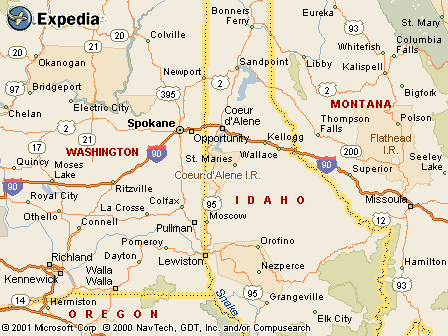|
|
Canku Ota |
|
|
(Many Paths) |
||
|
An Online Newsletter Celebrating Native America |
||
|
October 19, 2002 - Issue 72 |
||
|
|
||
|
Playing Without Reservation |
||
|
by Rick Thomas Coeur
d'Alene Press
|
||
|
credits: Jason Hunt/Press
Cousins Darnell Williams, 19, front, and Andrae Domebo, 18, are hoping to be the first of many American Indian athletes to play basketball at North Idaho College. |
|
"You don't know what you're missing if
you haven't tried Indian tacos or fry bread," said Andrae Domebo. He should know -- he grew up on the traditional
American Indian foods. Domebo, 18, and his cousin, Darnell Williams,
19, are American Indian basketball players at NIC this year. Williams, from Moscow, and Domebo, from Lapwai,
grew up playing basketball together in the area. "I danced for a year when I was about
6 or 7," said Domebo. But basketball got his attention and his time. "It's something a lot of us really get
into," he said. Domebo got good enough at it to win a basketball
scholarship at NIC, and arrived just in time for the beginning of classes
on Aug. 26. Williams played basketball last year for the
College of Southern Idaho, and was registered this year at Spokane Community
College, where classes begin two weeks later than at NIC. He visited his cousin in Coeur d'Alene on
the second day of school and the plan changed. "I really liked it here," said Williams.
He transferred and moved in to the NIC Residence
Hall, where he and his cousin share a dorm room. But there are rules at the hall against smoking
or even burning candles or incense -- rules that run counter to some
of the American Indians' spiritual customs. Williams is of the Nez Perce tribe. Domebo
is half Nez Perce, and traces that ancestry back to Chief Joseph. On his mother's side he is Cherokawa Apache,
with lineage to the most famous Apache of all, Geronimo. Burning sweet grass, sage and cedar are part
of the cleansing ritual called smudging they perform several times a
day. "You do it until you feel relieved,"
said Williams. With encouragement from Darrell Tso, the NIC
American Indian and minority student advisor, the rules were relaxed
to allow the pair to perform their ritual. "Where we live is a sacred place. It
is where our spirituality lives," said Tso. It's not something they do on a schedule,
just when they feel the need. "How can you put a time on spirituality?"
asks Tso, an Arizona Navajo. He and the two students have become close
friends, and Tso hopes they'll be part of a wave of American Indian
students coming to the college. "These guys are pioneers," Tso said. Some schools would require the Indians to
lose their traditions, he said. "I think NIC is giving them a good opportunity
and many more will follow," Tso said. Domebo said when he first arrived, he felt
a little homesick and lonely. Having his cousin with him made campus
life more comfortable. "Now we know everybody in the dorm,"
he said. Other students are beginning to understand
what their smudging rituals mean. "At first they thought that smoke was
something else," Domebo said. For Williams and Domebo, it's as natural as
fry bread and Indian tacos. They don't remember their first time for either,
but know it's always been a part of their life. "It's a way to get in the right frame of mind," Williams said.
|
|
|
||
|
|
||
| Canku Ota is a free Newsletter celebrating Native America, its traditions and accomplishments . We do not provide subscriber or visitor names to anyone. Some articles presented in Canku Ota may contain copyright material. We have received appropriate permissions for republishing any articles. Material appearing here is distributed without profit or monetary gain to those who have expressed an interest. This is in accordance with Title 17 U.S.C. section 107. | ||
|
Canku Ota is a copyright © 2000, 2001, 2002 of Vicki Lockard and Paul Barry. |
||
 |
 |
|
|
The "Canku Ota - A Newsletter Celebrating Native America" web site and its design is the |
||
|
Copyright © 1999, 2000, 2001, 2002 of Paul C. Barry. |
||
|
All Rights Reserved. |
||
 COEUR
d'ALENE, ID - Even if you aren't going to the Yap-Keehn-Um Powwow at
North Idaho College for the dancing or the drumbeat today or Saturday,
go for the food.
COEUR
d'ALENE, ID - Even if you aren't going to the Yap-Keehn-Um Powwow at
North Idaho College for the dancing or the drumbeat today or Saturday,
go for the food.